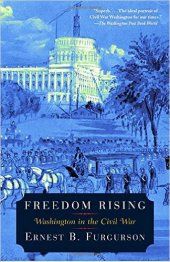Freedom Rising: Washington in the Civil War - Ernest B. Furguson

Freedom Rising: Washington in the Civil War - Ernest B. Furguson
Non-Fiction
Pages: 463
Most histories of the Civil War are about either the military events or the major personalities, and for obvious reasons; but sometimes the micro-histories are far more interesting, focusing as they do on the lives that went on under the shadow of the war, the minor players who may have made only a small impact on the grand events but whose lives were irrevocably changed by the sweeping and fluctuating fortunes of the war. These are the kind of people whose lives often survive now only buried in records and archives, rather than memorialised by history and remembered by all, but those lives are no less worth studying.
This book is very much a portrait of Washington at war, and all of Washington from President Lincoln down to the most minor of clerks and soldiers. We meet Thomas Walter, architect of the Capitol, struggling to finish the mighty dome and crown it with the statute of Freedom; Walt Whitman, ministering to wounded soldiers in the many hospitals of the capital; a Union major falling in love with an accused Rebel spy; detective Allan Pinkerton tracking down Confederate sympathisers; Elizabeth Keckley, an ex-slave and Mary Lincoln's close friend and dressmaker; and assassin-in-making John Wilkes Booth. Obviously Lincoln stands head and shoulders (in life as in these pages) above the other characters here, but one could hardly write a book about Civil War Washington without giving due to the President and Commander in Chief.
It was a thoroughly entertaining and enjoyable read, but not one for the serious student of Civil War history. It reads very much more as a series of anecdotes and vignettes, darting from personality to personality. There is little focus on the causes and catalysts of the war, little focus on the broad political issues of the time, other than those arising from individual conflicts, clashes and personal ambition, such as George McClellan and Salmon P. Chase. It is also a very white book - other than Elizabeth Keckley and the odd mention of Frederick Douglass, few African-Americans feature in these pages other than as an amorphous mass of 'coloured soldiers' or 'contrabands'.